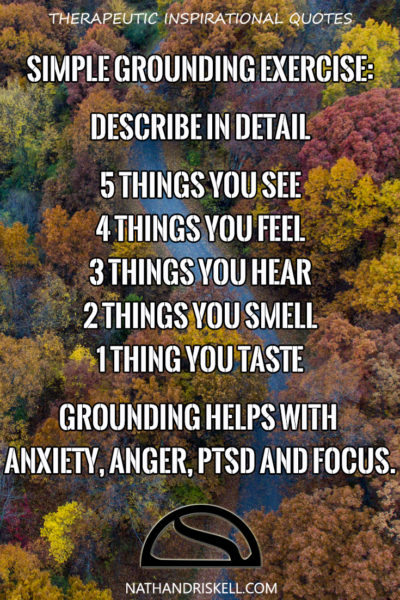
Original Publication Date: January 24, 2017.
Coping skills often get a bad rap. Often, therapists say, “Use your coping skills” to help with almost any problem. It can be depression, anger, or anxiety, and we are told to “Use your coping skills” to deal with it. As a result, we have begun to downplay coping skills as solutions, as they can appear overused. Does this mean coping skills are a waste of time? Not in the least. However, correctly using coping skills is not as simple as you would think.
When therapists say “Coping Skills,” the word “Skill” is often ignored. Learning to use coping skills effectively takes time and effort. For example, meditation is a powerful coping skill that can take months or even years to master. All coping skills are the same; they take time and discipline to gain the maximum effect. Does this mean coping skills are useless or too difficult to use? To answer that, we will discuss Grounding, one of the strangest and most useful coping skills.

What is Grounding?
Grounding as a coping skill has been around for some time. The purpose of grounding is to divert focus from something distressing to something more pleasant. By shifting focus to something in the environment, we can better control what we experience. To do so, we use the information our five senses provide. For example, if I were anxious over something and could not stop thinking about it, I would look around and focus on something I see to distract myself from my anxiety. After performing a grounding exercise, I will be better able to shift my focus away from my anxiety by becoming more aware of what is around me.
By systematically engaging each of the five senses, this technique facilitates a mindful connection to the present, effectively interrupting cycles of anxious or negative thoughts. Research supports its efficacy; for instance, the University of Rochester Medical Center highlights that such grounding exercises can be particularly beneficial during periods of anxiety or panic by helping individuals regain control over their immediate thoughts and sensations (University of Rochester Medical Center, 2018).
Incorporating the 5-4-3-2-1 grounding technique into one’s coping repertoire offers a practical and accessible means to navigate moments of distress, fostering resilience and promoting mental well-being.
Grounding is a series of exercises designed to use all your senses. For each sense, you note what your senses are telling you. To begin, we will focus on sight.
5 Things You See
To begin, you will describe five objects you see around you. Pick one and begin to note its appearance. Describe its shape, colors, and function. Give yourself 10 seconds to describe the object. Below is an example:
Object: A Box Fan
“I see a fan. It is square in shape. The sides are slightly curved, although the overall shape is square. The fan is white, with traditional fan blades. It is about two feet or so high and about 2 feet wide. It is on right now and making a slight humming noise. It has a white handle on top and a gray knob to adjust the speed”.
In this example, the fan is described in detail. You can think this or say it out loud if you are alone. The more information you use when describing, the more focus you will gain. An incomplete description would be “I see a white box fan,” as it does not give enough detail. In this exercise, you describe five things you see in similar detail. Do not describe four objects or six; use exactly five.
4 Things You Feel
Next, describe four things you feel. Feelings include both physical sensations in your body as well as emotional feelings. Examples include hot, tired, hungry, worried, angry, and pain. It can include the feel of your clothing or a headache you are experiencing. Below are two examples, a physical and emotional feeling:
Physical Feeling: Tired
“I feel tired right now and have for most of the day. I did not sleep well last night; I could not fall asleep. I feel tired throughout my body, and my head hurts somewhat. It is hard to keep focus feeling this tired. Now that I am more aware of being tired, I will focus on keeping myself awake by working on something”.
In this example, I feel tired due to a lack of sleep. I also noted other feelings, such as the pain in my head. I ended the example with an action that I would focus on working to keep myself awake. Next, we will describe an emotional feeling:
Emotional Feeling: Anxious
“I am feeling anxious right now. At first, I did not know why; however, after thinking about it, I worry about a test I have later this week. I have had problems in this class for most of the semester and worry I will fail the test. The anxiety is like a buzzing in the back of my head. Maybe if I study some, my anxiety will decrease”.
In the example above, note the source of the anxiety. By knowing the cause, you may be able to do something to reduce the anxiety. In the example, stress is caused by worry over a test later in the week. By studying for the test, anxiety decreases as direct action is taken to solve the problem. For any negative or distressful feeling, ask yourself what you can do to affect it directly.
3 Things You Hear
Next, focus on three things you hear in the background. If possible, close your eyes and listen to what you hear. Note the not-so-obvious sounds you hear and begin to describe them to yourself.
Sound: Music in the background
“I hear light music in the background. It is faint as it is coming from down the hall. It sounds like some jazz piece, although I cannot make it out. It is not unpleasant, although I cannot hear it very well. I did not notice it at first until I focused”.
As you practice, try to note sounds that are difficult to hear. You want to put effort into this to get your mind focused on something else. Try to record the cause of the sound and what you think about it. If you do not like the sound, or it is unpleasant, note this in your mind. The further down this list you go, the more concentration you will need, as these senses are not as sharp as sight or feeling.
2 Things You Smell
Things become more complicated with smell and taste. Sometimes it’s hard to distinguish between smells or note smells in certain environments. You will need to practice, as our noses are not very good. Take a deep breath and note what you smell. Often, it will be something you have eaten or drunk recently. Other times, it will be something in the environment. In this exercise, try to focus on not-so-distinct smells and concentrate more on the ones you may have missed.
Smell: A distant pine smell
“I smell some pine smell, something faint. I think it’s a cleaning solution, maybe pine sol? I did not notice it at first, but it is there. Maybe it was used weeks ago. It is a nice smell. It reminds me of the woods where I took my last vacation”.
As in previous examples, note the possible source of the smell and what you think about it. If specific memories come up, follow them. The more time you spend thinking about what you smell, the better.
1 Thing You Taste
While taste may seem the easiest sense, it is often the hardest. Tastes often blend and are sometimes difficult to describe. Remember what you ate or drank lately and see if you can detect it. If a particular taste is noticeable, try to focus on another, something more in the background.
“I taste some bitter flavor. It is hard to describe, as I cannot detect the source. I drank coffee hours ago, which may be bitter, although it does not taste like coffee. Something else is there, pepper? I had some jerky an hour or so ago; that may be it”.
The more time you spend, the better you will distinguish different tastes. If you cannot pin down the source of the taste, describe how you feel about the taste.
Final Focus
Now that you have finished with all your senses, you will end the exercise by determining what you want to do next. As we try to distract from something negative, we need a set task to complete, or our thoughts will drift back to the negative. Using the examples above, determine an action you can complete to benefit you in the next few minutes.
Example: Studying to Reduce Anxiety
“I noted I was anxious earlier about my test at the end of the week. I will study for my test during the next half hour to reduce my anxiety. Hopefully, I will feel better after I study some. At least I won’t be worrying about it!”.
By completing an action, we must take our minds off what is distressing us. In truth, grounding is about noting distress and then planning to combat it. By taking action, worry has no power and no place in your mind. Grounding works the same for any negative emotion.
Repetition
Grounding does not automatically work the first time you try. You need to practice it to become good at it. At first, you may not notice much beyond the action; you take at the end. However, over time, you will know more about how you feel within your body and your emotional state. You will start noticing more things in the background, and your senses will improve. It is common for people practicing grounding to be more aware of sounds, smells, and tastes.
I suggest practicing grounding at least a couple of times a day. Grounding can be done anywhere, as you can imagine the steps in your head. It can be done while driving to work, or in the classroom, or watching television. Once you have memorized the order and are more comfortable with grounding, begin to use it anytime you have a distressful feeling you want to ignore. If you need to practice grounding 50 times daily to feel better, do so.
In Conclusion
Grounding is a strange coping skill that takes time and effort to learn. While different, grounding can help with many conditions. I have seen people with schizophrenia practice grounding to combat hallucinations, and individuals with panic attacks use grounding to gain control of their bodies. Grounding is one of the best coping skills if you put the training into it. Try it today; it could change your life.
References
University of Rochester Medical Center. (2018). 5-4-3-2-1 Coping Technique for Anxiety. Retrieved from https://www.urmc.rochester.edu/behavioral-health-partners/bhp-blog/april-2018/5-4-3-2-1-coping-technique-for-anxiety
- The Mental Health Benefits Of A Smartphone Break - February 25, 2026
- Did A Boy Kill His Adoptive Father Over Nintendo Switch? - February 23, 2026
- Brain Changes Linked to Mindfulness in Gaming Disorder - February 18, 2026








Excellent article, Nathan! This Simple Grounding Exercise is very practical. I will share it with my coaching clients – many of whom are college students and young adults with ADHD who are also on the Autism Spectrum. Thank you for sharing this exercise!
You are welcome. I have seen grounding work wonders for people with numerous conditions.